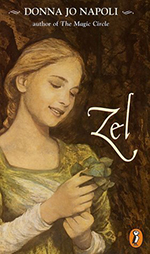‘Zel’ is a fairy tale, but not for little children
November 1, 2016
 Do not be fooled by the young adult rating for this book. “Zel,” by Donna Jo Napoli, is a hightly researched and emotionally complex book that leaves you sitting and contemplating the reality of loving relationships.
Do not be fooled by the young adult rating for this book. “Zel,” by Donna Jo Napoli, is a hightly researched and emotionally complex book that leaves you sitting and contemplating the reality of loving relationships.
Allow me to explain. The book is told from three alternating viewpoints: Zel, Count Konrad, and the witch.
We begin Zel’s story when she is a bright, lively girl of twelve, who loves her mother and her yearly trips to the town. She meets a young man who catches her eye, and this is the beginning of a budding sexual awakening.
Her mother realizes what is happening, and immediately sweeps Rapunzel away to the infamous tower, the one that she can never leave. Slowly, the bright and vivacious young girl slowly looses her mind in captivity until Konrad finds her.
Count Konrad is, I have to say, a stalker. At 15, he meets the young Zel and is immediately spellbound, or should I say, obsessed. He spends two years hunting high and low for her, wanting nothing but to find her.
In the sections from Konrad’s viewpoint, we actually learn a lot about the budding Baroque era the story takes place in, of the prince’s Enlightened education taking the place of medieval superstition. However, this does not change the fact Konrad is a creepy stalker.
And finally, the witch. Her side of the story is told in first person narrative, and she has no name other than the one she gives herself: Mother. Mother is so obsessed with the role of motherhood that she completely identifies as only a mother, so much so that she commits terrible deeds to be one, including selling her soul to the devil for magic, and forcing Zel’s original parents to give her up.
At the first sign that her stolen daughter might become interested in someone, she locks Zel away so that Mother will be the only one important to her, never mind the fact that it’s slowly driving her daughter mad. She reasons with herself that it’s the only way to keep them together, and she ignores her growing daughter’s pain.
This book is not meant to be read by little children, but if you’re interested in an emotionally in-depth fairy tale, then please read this book.






























